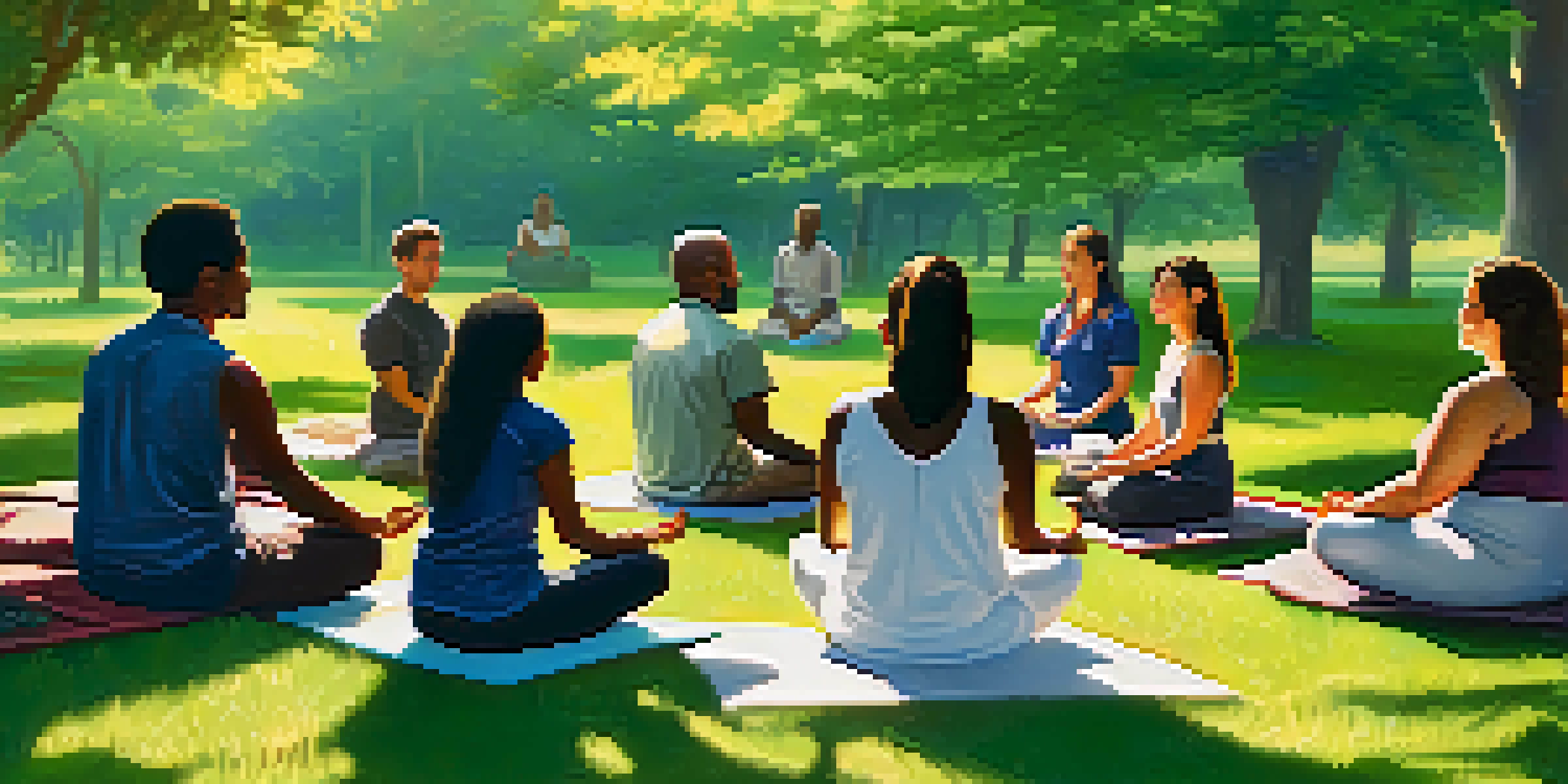Meditation as a Tool for Social Activism and Change

Understanding the Intersection of Meditation and Activism
At first glance, meditation and activism might seem worlds apart. Meditation often evokes images of quiet reflection, while activism is all about loud voices and action. However, both practices share a common goal: promoting awareness and creating a better world.
Meditation is the key to unlocking the door of compassion, allowing us to serve others with a heart full of understanding.
When activists engage in meditation, they cultivate a deeper understanding of themselves and their motivations. This self-awareness can be crucial when addressing complex social issues, allowing activists to approach problems with clarity and focus. In this sense, meditation can serve as a grounding force amid the chaos of activism.
By merging these two practices, individuals can harness the transformative power of mindfulness, leading to more effective and compassionate activism. This blend not only strengthens personal resolve but also fosters a supportive community dedicated to change.
The Benefits of Mindfulness in Activism
Mindfulness, a key component of meditation, encourages individuals to stay present and fully engage with their surroundings. This practice can significantly enhance an activist's ability to connect with the issues they care about and the people they aim to help. By being present, activists can better understand the needs and feelings of the communities they serve.

Moreover, mindfulness can help reduce stress and prevent burnout, which is all too common in the demanding world of activism. By taking the time to meditate, activists can recharge their emotional batteries, maintaining their passion and commitment even during challenging times.
Meditation Enhances Activism Clarity
Meditation fosters self-awareness, enabling activists to approach social issues with greater focus and understanding.
In this way, mindfulness acts as a protective shield, allowing activists to stay focused and resilient. It promotes a sense of peace and purpose, equipping individuals with the mental clarity necessary to tackle even the most daunting social challenges.
Meditation Techniques for Activists
There are various meditation techniques that activists can integrate into their routines. Simple practices like focused breathing or loving-kindness meditation can be done in as little as five minutes, making them accessible even on the busiest days. These techniques can help clear the mind and foster compassion, essential qualities for effective activism.
The greatest weapon against stress is our ability to choose one thought over another.
Guided visualizations are another powerful tool, allowing activists to envision their goals and the impact of their work. This technique not only strengthens motivation but also helps create a sense of connection to the larger movement, enhancing the feeling of purpose.
Incorporating these techniques into daily life can transform the way activists approach their work. By regularly taking time for meditation, they cultivate a calm mind and an open heart, essential attributes for fostering social change.
Creating Community Through Group Meditation
Group meditation can be a powerful way to build community among activists. By coming together to meditate, individuals can share their experiences, challenges, and victories, fostering a sense of belonging. This collective practice reinforces the idea that change is not a solitary journey but a shared commitment.
Additionally, group meditation can amplify the energy and intentions of participants. When individuals meditate together, their shared focus can create a powerful collective consciousness, enhancing the impact of their activism. It’s a beautiful reminder that we are all connected in our desire for a better world.
Mindfulness Reduces Activist Burnout
Practicing mindfulness through meditation helps activists manage stress and recharge, preventing burnout in their demanding roles.
These shared moments of stillness can also serve as a platform for discussion and collaboration. By uniting in meditation, activists can brainstorm new ideas, strategies, and paths forward, combining their strengths to effect meaningful change.
Meditation as a Stress Relief Tool for Activists
Activism can be an emotionally taxing endeavor, often leading to high levels of stress and anxiety. Meditation offers a valuable refuge, providing activists with a way to process their feelings and regain composure. Through regular practice, individuals can learn to manage their emotional responses, leading to a more balanced approach to their work.
By dedicating time to meditate, activists can cultivate a sense of inner peace amid the turbulence of their efforts. This practice encourages a healthier perspective, reminding individuals that while the issues they address are critical, their well-being is equally vital.
As stress levels decrease, activists may find themselves more effective in their roles. With clearer minds and calmer hearts, they can forge stronger connections, communicate more effectively, and inspire others to join the cause.
The Role of Compassion in Activism
Compassion is a cornerstone of effective activism, allowing individuals to connect deeply with the struggles of others. Meditation nurtures compassion, encouraging practitioners to extend kindness not only to themselves but also to the communities they serve. This empathetic approach can transform the way activists engage with social issues.
When activists practice compassion, they are more likely to approach conflicts with understanding rather than anger. This shift in perspective can lead to more constructive dialogues and collaborations, ultimately fostering an environment conducive to change.
Compassion Strengthens Activist Movements
By nurturing compassion through meditation, activists can foster deeper connections and inspire more inclusive and effective social change.
By integrating compassion into their activism, individuals can create a ripple effect, inspiring others to adopt similar values. This collective commitment to empathy can reshape movements, making them more inclusive and effective.
Building Resilience Through Meditation
Resilience is a critical quality for anyone involved in social activism. The journey toward change can be fraught with obstacles and setbacks, but meditation can help build the mental fortitude needed to persevere. By fostering a mindset of resilience, activists can remain committed, even when faced with challenges.
Through regular meditation practice, individuals can develop a greater sense of acceptance and adaptability. This perspective allows activists to navigate the ups and downs of their journey with grace, understanding that setbacks are often part of the process.

Ultimately, resilience nurtured by meditation empowers activists to stay the course. With a strong foundation of inner strength, they can continue to fight for social justice, inspiring others along the way.